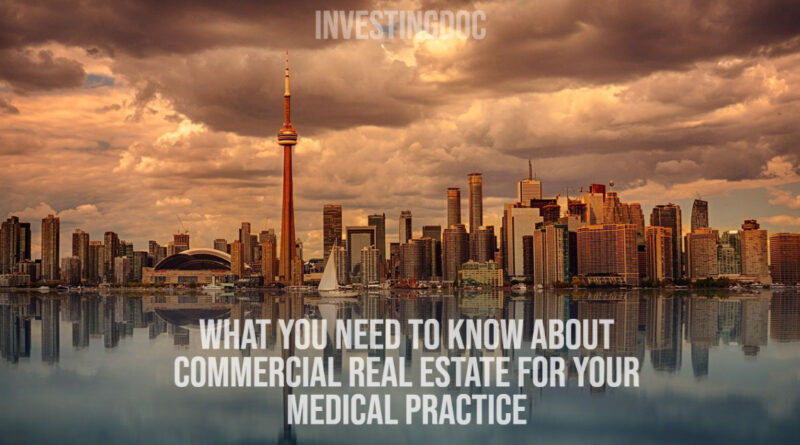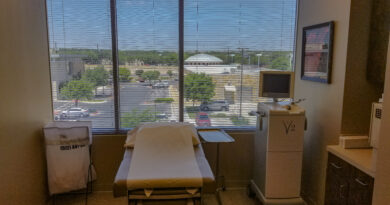What You Need To Know About Commercial Real Estate For Your Medical Practice
We currently have two locations for our practice. Soon, we will be expanding our real estate portfolio for our medical practice to three locations. Finding commercial real estate can be more difficult than you think. There are a lot of nuances to commercial real estate. Should you buy or rent? This post will go over how we are going about finding a new location, how I found my past locations, and what you need to know.
Keep Overhead Low
If you are just starting your practice or business, you want to keep costs as low as possible. Afterall, you can see in this post how much a medical practice makes early in its life. Spoiler, it is not maybe as much as you think.
I subleased for my first space, and I am very thankful that I did. I had two exam rooms and just over 800 square feet. One room only was all mine for most days. Towards the end of that sublease, I had 3 doctors rotating working through that one exam room.
Rent for this sublease was about $2,750 a month including NNN.
If you can swing it, try to sublease when you start out. You will save a lot of money while you build your practice and brand. Find a nice place that is already established if you can to put your name on until you start to grow.
How To Find A Sublease In Medical Real Estate
The best way is through word of mouth. If you already work at a hospital system, talk to your peers and see if they have any extra space to rent. Of course, talk to people who you won’t be competing with.
For example, if you are a GI doctor, it is unlikely that the competitor GI group in town will even entertain the idea of you subleasing from them. Instead reach out to primary care, OBGYN, or podiatry to see if they have unused space.
The second way to find a sublease is to cold call. Drop off your card at several offices, and see if you can talk to the office manager. When someone approaches me for sublease I want to know the following.
- What is your specialty?
- How big is your practice (just starting out or already established)
- What is your expected daily volume of patients through the office?
- How much support staff will you need?
- How many days or half days will you need?
- Any ancillary equipment you will be bringing (ultrasounds?)?
- How much are you wanting to rent the space for?
Someone who can answer these questions quickly and succinctly is much more likely to get a response from me to seriously entertain the idea of subleasing from me. Also, anyone who even hints at a kickback gets not taken seriously.
A good example of this may be a GI doctor who tells me that they will sublease from me but willing to pay me much more if I just so happen to send more referrals their way. That is illegal, unethical, and a hard no. Sadly, I have been approached with such a deal before and had to tell them to get lost.
Benefits Of Renting
In the beginning of your practice you might ask the same question that I did. Should I rent or buy real estate for my medical practice?
Renting early on allows quite a few benefits. The largest benefits are:
- Decreased upfront costs to set up and move in. There is no 20% down payment. Rent is often deferred until build out is complete.
- Your landlord will often contribute to tenant improvements if you sign a long enough lease. This means that they might “give you” $15 per square foot for improvements to the space is you sign a 10 year lease.
- You can move locations much easier if you ever wanted to
- You know what your costs are going to be and do not have to worry about market fluctuations of the space you are in.
- Saving capital to allocate to other areas due to less up front costs.
Benefits Of Buying
- Your medical business pays your commercial rent which builds equity and your net worth.
- Banks love owner occupied medical practices. They are very low risk
- More say in what you can do with your space since you won’t have to get your landlords approval since you are the landlord.
- Using depreciation as a tax shelter. You can take 27.5 years of depreciation against a new development to lower your taxable income as depreciation on the building.
- Chance of market appreciation of your real estate. When you want to retire or sell, you might make a lot of money off selling the real estate.
- You pay yourself rent and not someone else.
Capital Allocation Benefits To Renting
When I bought my space, I had to put a lot of money down. The total cost was somewhere around 1.6 million dollars. I had to put over $400,000 of my own money into the project.
That is a lot of capital that I had to allocate to ONE location / commercial project space.
If a group is more focused on growing fast, it might make more sense to use that $400,000 to rent more locations and open in rental units to grow the brand or practice.
It is going to be very tough to come up with $400,000 for most small practices every year to buy and open yet another commercial real estate location.
For this reason, this is why we are torn between renting vs buying for our third location. The first two are already owned. It is an ongoing debate about how much capital we want to tie up by buying yet another location. That might instead could help up open 2 new clinics as rentals.
Stuck In A Lease
The worry many doctors have, and one that I shared, was what if I get stuck in my lease?
Commercial real estate in the medical world is much different than residential. You will have a hard time finding a space that will want to rent to you for less than 5 years.
Commercial real estate for small medical practices will also make you sign a personal guarantee to pay off that lease.
Several of the commercial spaces that we are looking at now are currently leased for another 7-10 years by another medical group that has outgrown the space. Some of these spaces have been vacant for over a year, but that medical group is still paying rent on the space.
The idea of paying $10,000 a month for a commercial space that we are no longer using is frightening. It also may take years before you can find someone to take that lease off your hands….if you can find someone to take it off your hands.
The reason why it might be hard to get someone to take the lease from you is because of renewals. Getting someone to take over a sublease is hard when that group may have to make improvements and have no guarantee that the landlord will renew with them.
A Bad Deal For Taking Over A Lease
Let us say that you decide to take over the lease for another medical practice that they decided they no longer needed. In this example, we will say to 3000 square foot space and is $10,000 a month including triple net.
If that initial medical practice had a 10 year lease, and is moving out after 3 years, there are 7 years left on the lease.
If you take over that 7 years, you might have to fix up the space completely. Since you don’t have a deal with the landlord, you won’t get any tenant improvement money. This cost will either come out of your pocket or the person trying to offload the property to you since they might be desperate to get this liability off their books.
However, at the end of those 7 years, you have no deal with the landlord. You technically took over and subleased it from the previous medical group.
Now that you spent a lot of money on the space, your lease is coming up for renewal. The landlord can hike your rent significantly because they know that you will have to move and start all over. You will have little to no negotiation in this example.
Taking over a lease is a terrible idea for the buyer unless you can get a guarantee for renewal at a certain rate.
This is also why long term leases are frightening. They are hard to get out of for commercial spaces. You essentially have to buy out the lease to get out of your contract, or pay for the monthly rent until you can get someone else to take it over or your lease runs out.
In my above example a 10 year lease at 10k a month is a $1,200,000 liability for you. Make sure you know that is the worse case situation, that you are liable for that debt.
Downside To Owning Commercial Medical Real Estate
If you buy an older building, maintenance can be a big problem. Do you think that your HVAC replacement costs at your home are high? Try looking into commercial units.
For 3,300 square feet, I paid around $60,000 for our HVAC units. For a residential house, that would probably be two, two-ton units costing about $7,00 each ($14,000 total).
Old commercial buildings can be a huge money pit if you have to replace windows, plumbing, HVAC or roof. Know the condition of what you are buying into and be careful. If you rent then all these problems are your landlords problems and not yours.
Commercial Agent
There are websites such as LoopNet that offer a Zillow like look at commercial space for rent. However, commercial is so different than residential. I would estimate that half of the spaces that we looked at, were not on the market. They were “pocket listings.”
Find a good commercial real estate agent. Look at LoopNet to get ideas what might be for rent, but you will 100% need a commercial real estate agent. They will know the market and help navigate you.
SBA vs Conventional Real Estate Loan
Small business administration loans are an option for many new practices. The benefit with these loans for many new practices is that usually put less money down and they are more accepting to newer businesses.
The downside to SBA loan are the fees. For example, closing costs on my conventional loan was about $8,000 with some cash back that I was able to get. The SBA closing costs were $30,000-$40,000.
The other downside with SBA loan is that there is a much more strict pre-payment penalty. Conventional loans for business usually only have a stepwise 3 year prepayment penalty. My loan has a 3% penalty for the first year and goes down by 1% per year until year 4 where it is zero.
Summary
Many physicians say that the real estate is where they made the bulk of their money when they decided to sell their practice.
If your goal is to have a small practice with 1 or 2 locations, most likely make sense to buy. However, if your goal is to grow your business as large as possible, then in my opinion it makes sense to allocate that capital elsewhere and rent many of your locations.
Although it is nice to see a place across the street sell for 30% more than I bought my space 2 years ago, I won’t lock in any of those gains for years in the future until I sell. At least I have hedged my bet against inflation to have a fixed mortgage on my space in the event prices continue to go up.
YouTube
Video coming soon. I recorded a video and the audio was so bad (lots of echoing) it was unusable, so I will have to re-record it.





